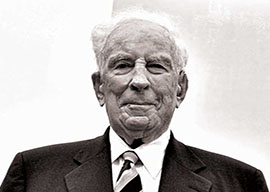
January 04, 2011

“Conservative Tycoon … Dies at 95,” said the New York Times headline on New Year’s Eve about the death of Roger Milliken.
Clearly, the headline writer did not know the man.
For Roger Milliken exemplified the finest in American free enterprise. He cared about his workers. He cared about his industry. He cared about his community. He cared about his country.
Into his 90s, Roger was holding strategy sessions in Washington and walking the halls of Congress to convince free-traders half his age that, Esau-like, they were swapping the manufacturing base of their nation for a mess of Chinese-made pottage down at the mall.
It was 63 years ago, on his father’s death, that Roger took over the family business begun in 1865 and started to build Milliken & Co. into the largest privately owned business in America, a national and world leader in textiles and chemicals that today holds 2,000 patents.
In the 1950s, he relocated from New York to Spartanburg, S.C.
Few men did more to build the two-party system in South Carolina than Roger, who supported Barry Goldwater in 1964 and helped to persuade Strom Thurmond to leave the Democratic Party. In the 1960s, Roger had urged Wofford College to integrate its student body and promised to make up for any financial losses if it took the step.
The great cause of the later years of his life was his workers, his company and his country, all of which he saw imperiled by a global system set up for the benefit of transnational corporations for whom, as Thomas Jefferson wrote, the very ground “they stand upon does not constitute so strong an attachment as that from which they draw their gains.”
In 1985, Roger had come to the White House to persuade me to convince the president to sign a bill to slow the flood of textiles into the country. No way, I told Mr. Milliken. I’m the biggest free-trader in the building, except for the fellow down the hall, who was Ronald Reagan. Roger went away disappointed. Reagan vetoed the bill. And I supervised the writing of the veto message.
Within half a decade, however, some of us had seen the light and enlisted in Roger’s crusade to preserve the manufacturing core of the country that he rightly saw as inextricably tied to the prosperity and the pre-eminence of the United States.
Among the richest men in America, Roger did not have to lead this battle, or even to fight it. Indeed, he did not have to work. He could have retired and traveled the world as other billionaires did.